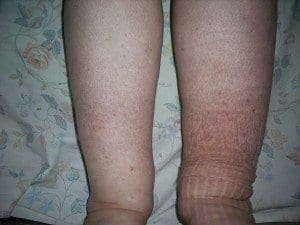Please support the Lymphedema Treatment Act. The cost of maintenance for patients like me prevents far more costly expenses from serious complications such as infections and even amputation.
I suffered seven years with lymphedema before receiving proper diagnosis and treatment. I have secondary lymphedema, onset after a difficult hysterectomy at age 46. Finding knowledgeable medical professionals and treatment was extremely difficult, requiring significant persistence and my own exhaustive research. Right now I am one of the ‘lucky’ ones. My lymphedema is under control because employer-sponsored health insurance covered the cost of physical therapy, where I learned to do the intensive self-care needed to prevent serious complications. Three hours a day, I manage the tasks required to keep my legs at minimal risk with manual lymph drainage, exercise, and using compression wrapping at night and garments during the day.
Following 30 years of employment, I joined the millions laid off during these challenging economic times. During the arduous search for new employment, the COBRA assistance ended and I could not afford the $680 per month for insurance. The compression garments I wear should have been replaced months ago, and there is noticeable problems to deal with as a result. Thankfully, I just gained part-time temporary employment with the hope of full-time and benefits in the near future.
Living with lymphedema is a challenge, but I call myself “lucky” because I had the health coverage to get the therapy and training I needed to restore my health and return to work. With that initial therapy to get me on track and the compression garments I use to maintain my health, I can continue working rather than progressing on to the disability path I was facing.
For the millions who suffer this painful, ugly and debilitating condition without upfront therapy and maintenance garments, many will face repeated and progressive complications, and costly hospital stays that could be prevented by proper preventive care.
Supporting this treatment is a fiscal and social responsibility. The initial investment in care reduces future health costs and improves quality of life. As a taxpayer, I expect public funds to be managed prudently, avoiding preventable expenses. Failing to provide the initial therapy and education and basic supplies for managing lymphedema is like never changing automobile oil, guaranteeing far more costly expenses down the road.
Finally, I share before and after photos of my legs with proper therapy. Amazingly, if I bared my legs they would look normal to anyone now, but only for about two hours without those precious maintenance garments.







